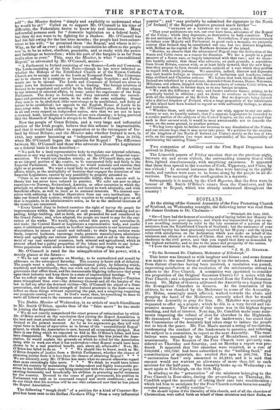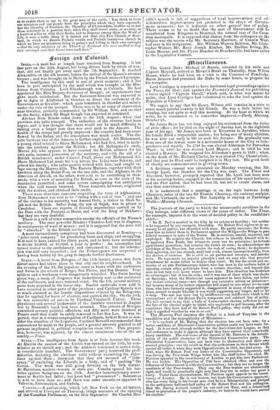SCOTLAND.
At the sitting of the General Assembly of the Free Protesting Church of Scotland, on Wednesday sennight, the following letter was read from Sir James Graham to Dr. Chalmers-
•• Whitehall, 8th June, 1843.
" Sir—I have had the honour of receiving and of laying before her Majesty the address which bears your signature, and which was transmitted by you to me. I am unwilling needlessly to refer to the late secession of a portion of the ministers from the Established Church of Scotland ; but the assurance of your continued loyalty has been graciously received by her Majesty : and the Queen relies with satisfaction on the declaration which you make on behalf of the ministers and elders of a church of Christ, that you will be steadfast in your obedience to the civil power, and that you regard that duty as demanded by the highest authority, and as due to the peace and prosperity of the nation.
"I have the honour to be, Sir, your obedient servant,
" J. R. GUARANI.
" To the Reverend Dr. Chalmers, Moderator of Edinburgh."
This letter was listened to with laughter and hisses ; and some demur was made to the usual form of entering it on the minutes. Addresses from distant churches having been received, a resolution was passed, expressing satisfaction at the resolution of the missionaries abroad to adhere to the Free Church. A committee was appointed to consider the proposition of the Original Secession Churc'a for a union with the Free Church ; and a deputation was received from the United Secession Synod. Dr. Malan of Geneva addressed the Assembly as a deputy from
the Evangelical Churches in Geneva. At the conclusion of his address, he was thanked by the Moderator in name of the Assembly. Dr. Malan, seemingly much affected, walked towards the chair, and grasping the hand of the Moderator, earnestly asked that he would desire the Assembly to pray for him. Dr. Makeller was accordingly requested to offer up a prayer ; which he did. in a very fervid and im- pressive manner. The whole of this scene was in the highest degree touching, and full of interest. Next day, Dr. Candlish made some state- ments respecting the refusal of sites for churches in the Highlands. He denounced that "conspiracy " of the landowners ; but stated that the Commission of the Assembly had taken steps to induce the people not to break the peace. Mr. Fox Maule moved a string of resolutions, condemning the conduct of the landowners in question, and referring the subject to a committee, to report to the next Assembly. The reso- lutions were seconded by the Marquis of Breadalbane, and carried unanimously. The finances of the Free Church were privately con- sidered on Thursday and Saturday, and on Monday a report was pro- duced. It appeared that 700 churches were required, at a cost of 350,000/. ; 166,7021. had been subscribed to the " building fund," and constributions of materials, &c. swelled that sum to 206,702. The " sustentation fund" only amounted to 28,2811; and it is said that amount would not warrant an allowance of more than 30!. to each minister for the half-year. The Assembly broke up oa Wednesday ; to meet again at Edinburgh, on the 16th May.
In alluding to the " persecution " of the ministers belonging to the Free Church in Ross-shire, during the proceedings on Thursday, Dr. Candlish urged the necessity of taking their case into consideration ; which led him to anticipate for the Free Church certain luxuries usually counted among " worldly vanities "- " He should rejoice if the liberality of this church, and of all the churches of Christendom, were called forth on behalf of these ministess and their flocks, so ap to enable them to say to the great men of the earth, ' You think to drive our ministers and our people from the principles which they bare espoused; but the liberality of Scotland, the liberality of Christendom, enables us to put those ministers in a .position that, when they shall travel sixty, or seventy, or a hundred miles to visit their flocks, and to dispense among them the Word of Life, it were a noble thing if it turned out that this Free Church of Scot- land, in which we disown Prelatic wealth and Prelatic luxury—a church in which we have no ministers living in palaces and lolling in their own carriages —that the only ministers of the Church of Scotland who were enabled to keep their carriages and their horses were such men."



























 Previous page
Previous page